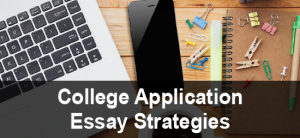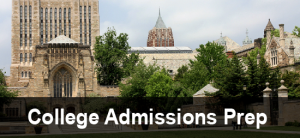Everyone knows that participating in extracurricular activities is important in terms of college admissions.
If you’re applying to schools that use the Common Application, you’ll have room to briefly highlight 10 of your extracurricular activities in their order of importance to you, and you can use the Additional Information section of the application to share even more details about your experiences (up to 650 words).
In your college application package, you need to do everything in your power to create a vivid, compelling image of yourself.
Obviously, your application essay plays an important role in helping admissions officers get to know you, but your descriptions of your extracurricular activities are also essential.
ONE REASON A STUDENT GOT REJECTED
FROM THE UNIVERSITY OF PENNSYLVANIA
When I visited the University of Pennsylvania, the admissions officer leading the information session shared the following story.
A faculty member’s son was rejected from Penn, and the father arranged a meeting with one of the admissions officers to make sense of the situation. As it turns out, one of the problems was that his son didn’t create a sufficiently developed description of the significance of his extracurricular activities.
 She pointed out that he put down “Translation” as his second extracurricular activity, but he didn’t say much about it in his blurb and didn’t mention it anywhere else in his application. She explained that if this activity was important enough to rank it second in order of importance, he should have described why it was such a meaningful experience. The father explained why this extracurricular activity was truly impressive and valuable. His son was one of just five students selected to be part of a translation team for Olympians from Beijing.
She pointed out that he put down “Translation” as his second extracurricular activity, but he didn’t say much about it in his blurb and didn’t mention it anywhere else in his application. She explained that if this activity was important enough to rank it second in order of importance, he should have described why it was such a meaningful experience. The father explained why this extracurricular activity was truly impressive and valuable. His son was one of just five students selected to be part of a translation team for Olympians from Beijing.
How you present your participation in extracurricular activities matters. It can matter a great deal in your college application package and in your alumni interviews. (CLICK HERE to learn more about how the inability to describe your experiences and interests can adversely affect you in the college admissions process.)
HARVARD’S DEAN OF ADMISSIONS
SHARES HIS PERSPECTIVE ON WHAT MATTERS
IN THE ADMISSIONS PROCESS
In his recent interview with the Harvard Gazette, William Fitzsimmons points out:
“We are always very interested in evidence of unusual achievements, academic or extracurricular. If you’re a great poet, we’d love to have you send your poetry along. You could send your short stories or mathematical solutions or computer programs or your life sciences research. Whatever it is you have done, we want to get that information to make the best possible case for your admission.”
He goes on to explain:
“With 35,000 people applying, you can see that standardized test scores are relatively unimportant in the end, because most of the people who apply have strong scores and grades and are fully qualified to be here. So the real question is to try to get beyond the test scores and grades. Examples of applicants’ accomplishments in math or music, to name just a couple of areas, help us do that. The people who have the energy, the drive, and commitment to do something unusual in math, music, athletics, theater, or any activity have transferable sets of skills. It’s human potential that now happens to be directed, say, at women’s rugby, but could also be directed at any other kind of activity during college and later.”
AN UNUSUAL ACHIEVEMENT
In this post, I’m focusing on unusual achievements in relation to extracurricular activities rather than on academics.
I want to let you in on a secret.
You don’t have to participate in (or limit your participation to) the traditional clubs and organizations at your school.
It is not unusual to be a member of your school’s Science Olympiad team and win a gold medal at the national competition. It’s not unusual to be president of a club or your class.
Don’t get me wrong.
Those are great accomplishments and honors, but they’re not unusual.
Let’s consider the case of fourteen-year-old Suvir Mirchandani, who came up with a simple plan that could save the federal government about $136 million per year and state agencies nearly $234 million–just by switching fonts (from Times New Roman to Garamond).
Pretty impressive, right?
Suvir’s unusual extracurricular accomplishment, which is connected with his academic interest in science, didn’t just happen overnight. It evolved over time.
PHASE 1: In his interview on HuffPost Live, Suvir describes how he first came up with the idea for this study. He explains:
“I had noticed that teachers were giving a lot more handouts and tests and papers than they were in elementary school, so I was thinking about different ways that we could reduce the amount of resources they were using. I thought about paper, and I thought about ink. For paper, we have these paper recycling programs [and] dual-sided printing–all to reduce paper toss and paper use. But, on the other hand, there’s ink, and I hadn’t heard much to conserve ink use, and it turns out that ink costs almost 6 times as much as paper does, so I thought it would be really interesting to see a project that could reduce ink use. I also noticed that some fonts use more ink–or appear to use more ink–by being bold or larger, so I decided to look into that for my science fair project.”
WHAT YOU CAN DO
If you notice that there are things at your school or in your community that are in need of improvement, try to think of some solutions. So many students are aware of problems but just complain about them or don’t know how to do anything to make them better.
This kind of project could wind up becoming the basis for a great college application essay and would work for this Common Application essay prompt: “Describe a problem you’ve solved or a problem you’d like to solve. It can be an intellectual challenge, a research query, an ethical dilemma—anything that is of personal importance, no matter the scale. Explain its significance to you and what steps you took or could be taken to identify a solution.” CLICK HERE to read my post on the “problem” essay topic.
PHASE 2: As part of his sixth-grade science fair project, he wound up studying how much money his school would save if they changed the font they used in their handouts. As it turns out, the school would save nearly $21,000 per year due to the reduced amount of ink needed to print their documents.
Click here to learn more about how he conducted this study.
WHAT YOU CAN DO
Take action to help make a positive difference. You might be able to create and implement your own action plan, but it’s totally fine if you need help. I highly recommend that you run your ideas by your teachers and ask if they can help you get the project underway.
PHASE 3: One of his teachers encouraged him to share his findings with a wider audience, so Suvir submitted his work to the Journal for Emerging Investigators (JEI), a scientific journal run by graduate students at Harvard University that “publishes original research in the biological and physical sciences that is written by middle and high school students.”
The journal’s team of reviewers challenged him “to apply his project to a larger scale: the federal government.”
It was through this additional study that Suvir discovered what remarkable savings the government could enjoy if it just changed the font size of its documents.
WHAT YOU CAN DO
Challenge yourself to keep expanding upon and developing your experiences and achievements.
Let’s say that you started an anti-bullying campaign at your high school and led a workshop to teach other students what to do if they see another student being attacked. Get in touch with your local newspaper to see if you can write an article about the experience and the effect the campaign has had on you and your classmates. Or you could get in touch with the elementary or middle schools in your area and see if you can host age-appropriate workshops for the younger kids.
WHAT ARE YOU GOING TO DO?
Now that you have some ideas about unusual extracurricular achievements and their role in the college admissions process, it’s time to spring into action.
You don’t want to do things merely because they’re unusual. Instead, you need to pursue your interests in unusual ways.
You might want to start by carefully assessing what you’re currently doing in your extracurricular activities and how you can step up the quality of your contributions by working on projects that transcend the boundaries of the particular club or organization.
Blog post images in order of use: ©pinkypills/bigstock.com, ©outsiderzone/bigstock.com



